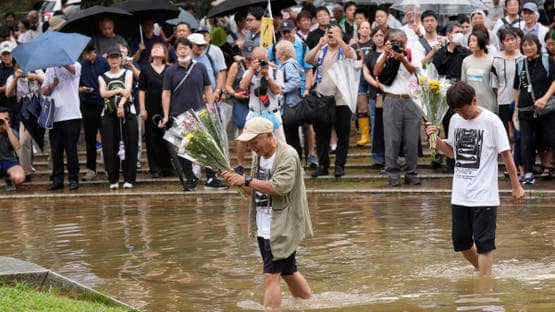Nagasaki Commemorates the Victims of the Atomic Bomb.. and Warns of the Dangers of Nuclear Escalation

Hundreds gathered today in the Japanese city of Nagasaki to commemorate the 80th anniversary of the atomic bombing that destroyed the city during World War II, amid warnings of escalating nuclear threats in light of current global crises.
At exactly 11:02 AM, the time the bomb fell in 1945, attendees observed a minute of silence in honor of the victims who perished in the disaster, while Nagasaki's mayor, Shiro Suzuki, called for urgent action to disarm nuclear weapons.
Suzuki stated in his speech: "This is a crisis threatening the survival of humanity and is approaching each one of us," emphasizing the need to adhere to the principles of the United Nations Charter. He added, warning: "There is no longer any room for delay in confronting this danger."
On August 9, 1945, the United States dropped the "Fat Man" bomb, made of plutonium-239 and weighing 10,000 pounds, on Nagasaki, resulting in the immediate death of 27,000 people out of a population of 200,000 living in the city. By the end of that year, the death toll rose to about 70,000 due to acute radiation.
The bombing came just three days after Hiroshima was destroyed by a uranium-235 bomb, prompting Japan to surrender on August 15, 1945, thereby ending World War II.
Suzuki described the testimony of a survivor of the tragedy, saying: "There were people around me whose eyes were gouged out.. the bodies were scattered like stones."
It is believed that the U.S. military targeted Nagasaki due to its importance as a major industrial port, and its mountainous terrain increased the concentration of the explosion's force.
The annual ceremony at the Nagasaki Peace Memorial Park was attended by representatives from 95 countries and regions, including delegations from the United States and Russia (which has the largest nuclear arsenal in the world) and Israel, which has not officially declared possession of nuclear weapons.
Survivors of the bombing continue to suffer from the effects of radiation and social discrimination, and with their numbers dropping for the first time to below 100,000 this year, their testimonies remain fuel for international efforts to prevent the recurrence of the tragedy.
Suzuki concluded his speech by reminding the international community of its responsibilities: "We must not allow the history of Nagasaki to repeat itself.. the world needs concrete steps towards peace."